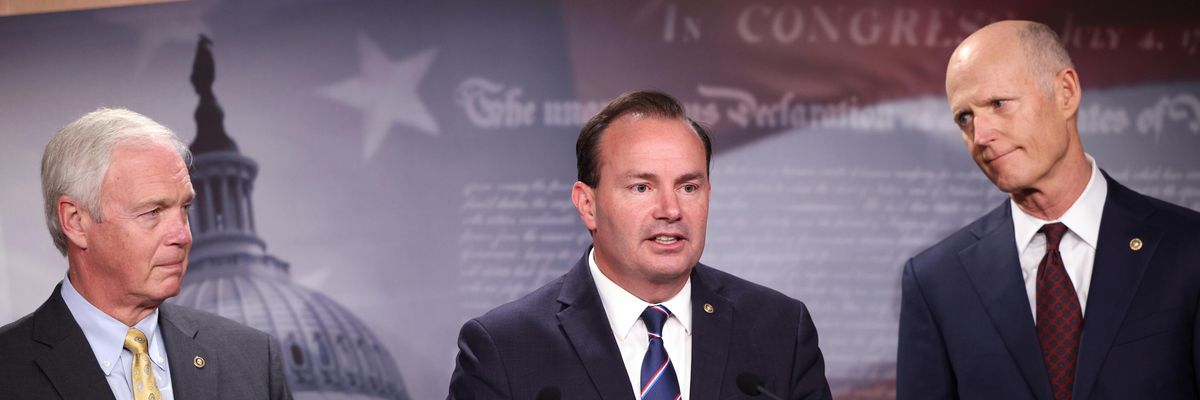

SUBSCRIBE TO OUR FREE NEWSLETTER
Daily news & progressive opinion—funded by the people, not the corporations—delivered straight to your inbox.
5
#000000
#FFFFFF
To donate by check, phone, or other method, see our More Ways to Give page.


Daily news & progressive opinion—funded by the people, not the corporations—delivered straight to your inbox.

Sen. Ron Johnson (R-WI), Sen. Mike Lee (R-UT) and Sen. Rick Scott (R-FL) speak on the bipartisan infrastructure bill during a press conference at U.S. Capitol on August 04, 2021 in Washington, DC. The group of Senators criticized the bill for being too expensive and claim it will increase the debt, inflation and taxes. (Photo: Kevin Dietsch/Getty Images)
The bipartisan infrastructure bill is making its way through the US Senate. This past weekend, 67 senators--including 18 Republicans--voted to cut off debate on the massive package, clearing the way for a final vote early this week. This kind of bipartisanship is heartening--and will lead to important investments in roads, bridges, rail, broadband internet and the electric grid. Yet the bill also thoroughly exposes the glaring problem with the Republican Party's opposition to additional taxes on corporations and the wealthy.
First, the bipartisan bill addresses only a small part of our investment needs. And, second, it doesn't even pay for those investments through offsetting budget cuts or tax increases.
Dear Common Dreams reader, The U.S. is on a fast track to authoritarianism like nothing I've ever seen. Meanwhile, corporate news outlets are utterly capitulating to Trump, twisting their coverage to avoid drawing his ire while lining up to stuff cash in his pockets. That's why I believe that Common Dreams is doing the best and most consequential reporting that we've ever done. Our small but mighty team is a progressive reporting powerhouse, covering the news every day that the corporate media never will. Our mission has always been simple: To inform. To inspire. And to ignite change for the common good. Now here's the key piece that I want all our readers to understand: None of this would be possible without your financial support. That's not just some fundraising cliche. It's the absolute and literal truth. We don't accept corporate advertising and never will. We don't have a paywall because we don't think people should be blocked from critical news based on their ability to pay. Everything we do is funded by the donations of readers like you. Will you donate now to help power the nonprofit, independent reporting of Common Dreams? Thank you for being a vital member of our community. Together, we can keep independent journalism alive when it’s needed most. - Craig Brown, Co-founder |
The bipartisan infrastructure bill is making its way through the US Senate. This past weekend, 67 senators--including 18 Republicans--voted to cut off debate on the massive package, clearing the way for a final vote early this week. This kind of bipartisanship is heartening--and will lead to important investments in roads, bridges, rail, broadband internet and the electric grid. Yet the bill also thoroughly exposes the glaring problem with the Republican Party's opposition to additional taxes on corporations and the wealthy.
First, the bipartisan bill addresses only a small part of our investment needs. And, second, it doesn't even pay for those investments through offsetting budget cuts or tax increases.
The bipartisan infrastructure bill is making its way through the US Senate. This past weekend, 67 senators--including 18 Republicans--voted to cut off debate on the massive package, clearing the way for a final vote early this week. This kind of bipartisanship is heartening--and will lead to important investments in roads, bridges, rail, broadband internet and the electric grid. Yet the bill also thoroughly exposes the glaring problem with the Republican Party's opposition to additional taxes on corporations and the wealthy.
First, the bipartisan bill addresses only a small part of our investment needs. And, second, it doesn't even pay for those investments through offsetting budget cuts or tax increases.